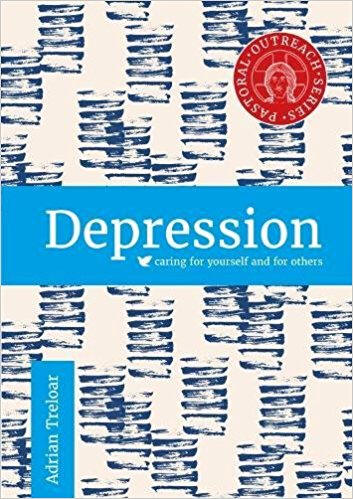Catholic Medical Quarterly Volume 68(2) May 2018
Book review
Depression Caring for yourself and others.
By Adrian Treloar
Publ: Redemptorist Publications (16 Nov. 2017)
ISBN: 978-0852315033
Reviewed by Dr Pravin Thavasathan
 This
is a very helpful and practical guide to helping those who suffer from
depression. Sufficient facts are presented to help us understand this
complex health condition. But the overwhelming thrust of the work is
active care.
This
is a very helpful and practical guide to helping those who suffer from
depression. Sufficient facts are presented to help us understand this
complex health condition. But the overwhelming thrust of the work is
active care.
Depression, says the author, is quite different from sadness. It is a set of symptoms that are disabling in a way that sadness is not. Anyone can get depression and in many ways it is no different from many physical health conditions like hypertension. The features include persistent low mood, feelings of hopelessness, sleep disturbance and loss of appetite. Persons with depression can isolate themselves and this makes matters worse. As depression increases, people may develop ideas of self harm. Sadly, some act on these ideas.
The author looks at risk factors which include unemployment, homelessness, being older, being isolated and in chronic pain. Throughout the work, there are helpful case histories to illustrate what is being said. In the section about severe depression, for example,, the author looks at people who have suicidal ideation and those who develop psychosis brought on by depression. Severely depressed people can develop delusions of damnation or a feeling that they have lost their faith. How valuable sound spiritual guidance is for those who are depressed.
The author examines bipolar disorder and depression after childbirth. He reminds us that the prognosis for depression is good when the right remedies are offered. Suicide prevention is critical and the Mental Health Act is used in appropriate instances.
The author notes the cultural variations in which depression presents. People from an Asian background are more likely to present with physical symptoms. Treatment needs to be holistic. Effective psychological and social support are essential. The author delicately reminds us that the depressed person needs to approach counselling with some care. Although counselling claims to be non-judgmental, the particular prejudices of the counsellor can surface. I am reminded of the counsellor who told a practicing Catholic that maybe her faith was leading to guilt feelings which in turn led to her depression. Rogerian therapy does not sit well alongside the Christian concept of virtue and sin. Freud's view that we are products of our biology does not fit well with the Christian concept of free will.
The author looks at the drug treatments on offer. The early antidepressants caused quite marked side-effects, unlike the newer ones. The author's examination of the role of faith in the treatment process is very helpful. Although prayer, which is always a challenge, may prove difficult, it is vital as is recourse to the sacraments. The wise sayings found in the Christian classic Abandonment to Divine Providence are an excellent remedy for those suffering from feelings of hopelessness.
Mistakes can also be made in our synthesis of faith and treatments. The idea that depression can be cured by recourse to faith alone is dangerous.
The author ends the book with some well known prayers. All in all, a very helpful resource
